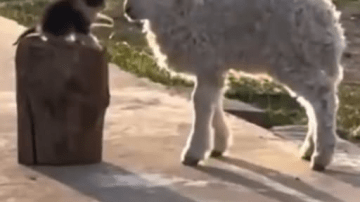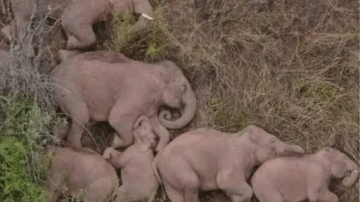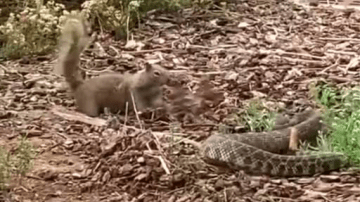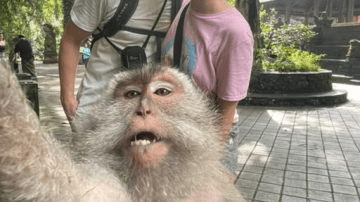The jungle was alive with sound that morning — the shrill cry of parrots, the rustle of leaves, the low hum of insects. It was a wild symphony of life. Yet beneath that harmony, something darker stirred. Deep within the thick green shadows, danger coiled silently. No one knew that the peaceful day would soon turn into a heart-stopping race between life and death — and that a few brave souls would risk everything to save a helpless creature from nature’s merciless grip.

A Peaceful Morning Turns Terrifying
It started as an ordinary dawn in a remote forest near Assam, India. The villagers had grown used to seeing elephants wander close to their farms. They were gentle giants, moving slowly through the mist, foraging for fruit and leaves. But on that fateful day, a young elephant strayed farther than usual, drawn by the sweet scent of ripe bananas.
What the elephant didn’t know was that danger was lurking close — in the form of one of the forest’s most feared predators: a giant python. Measuring over twenty feet long, it had been lying in wait for days near the watering hole. Pythons rarely attack elephants, but this one was desperate, its hunger pushing it toward an impossible target.
As the elephant reached down to drink, the silence shattered. A violent hiss sliced through the air. In an instant, the python launched itself forward, wrapping its massive coils around the elephant’s legs. The jungle erupted in chaos. Birds scattered, monkeys screamed, and the ground trembled as the giant beast trumpeted in pain.
The Struggle of Strength and Desperation
The young elephant thrashed wildly, its trunk swinging, its feet pounding the earth. Dust rose like smoke. The python tightened its grip, its muscles pulsing with horrifying power. The sound of constriction — scales scraping, breath choking — echoed through the clearing.
Minutes passed like hours. The elephant’s eyes widened in panic. Its trumpets grew weaker. If help didn’t come soon, the forest would witness a tragedy.
And then — faintly — a shout pierced the air.
The Heroes Arrive
A group of villagers had been collecting firewood nearby when they heard the elephant’s cries. Among them was Rakesh, a young forest guard known for his courage, and two of his friends, Meera and Arun. Without a second thought, they grabbed their tools — bamboo poles, ropes, and torches — and sprinted toward the sound.
When they arrived, the sight froze them in place. The python had nearly covered the elephant’s lower body. Its scales shimmered in the sunlight like armor. The elephant’s trunk reached out helplessly, its breath coming in desperate bursts.
Rakesh swallowed his fear. “We can’t let it die,” he said. His voice trembled but his resolve didn’t.
The plan was dangerous, almost reckless. But they had no time. They lit torches, hoping the heat and smoke would scare the python. Meera and Arun circled from opposite sides, shouting and waving their arms to distract the serpent. Rakesh moved closer, wielding a bamboo stick like a spear.
The python reacted instantly, turning its massive head toward him, fangs bared, mouth open wide enough to swallow his arm. Rakesh stood his ground. His heart pounded, but he refused to back down.
The Battle Between Man and Beast
With one swift motion, Rakesh struck the python’s body near its head. It hissed furiously, loosening its grip just a fraction. The elephant seized the moment — raising its trunk and swinging it with incredible force. The impact sent the python crashing against a tree.
For a moment, everyone froze. Then, as the serpent tried to coil again, Arun threw a burning branch at its tail. The fire crackled, smoke rising into the sky. The python recoiled, thrashing violently, trying to escape the heat.
Meera shouted, “Pull the ropes! Now!”
Together, the villagers looped ropes around the python’s midsection and tugged with every ounce of strength they had. The elephant, sensing the help, pushed with its trunk, trumpeting so loudly that it shook the trees. The combined effort finally worked — the python slithered backward, hissing in fury before retreating into the forest’s dark undergrowth.
The Elephant’s Breath of Freedom
When the dust settled, the elephant collapsed on its knees, trembling but alive. Its eyes blinked slowly, filled with exhaustion and pain. The villagers rushed to its side, pouring water over its body and speaking in soft, reassuring tones.
Meera placed a hand on its trunk. “You’re safe now,” she whispered.
The elephant let out a low rumble — not of fear, but of relief. It was a sound the villagers would never forget.
The forest guard radioed the wildlife rescue team. Within an hour, veterinarians arrived to treat the elephant’s wounds. The python’s constriction had left deep bruises and cuts, but miraculously, nothing was broken.
When the elephant finally stood again, the crowd cheered. It raised its trunk, as if to thank the people who had saved its life.
What Courage Really Means
The rescue spread quickly across the region. News outlets picked it up, calling Rakesh and his team “the fearless heroes of Assam.” But for those who were there, it wasn’t about fame. It was about the unspoken bond between humans and animals — a bond that transcends fear.
Rakesh later said in an interview, “When I looked into that elephant’s eyes, I didn’t see an animal. I saw a soul asking for help. You don’t think twice in moments like that — you just act.”
His words echo a truth we often forget: courage isn’t the absence of fear. It’s compassion in motion.
The Hidden Lessons of the Jungle
There’s more to this story than just survival. Scientists studying similar encounters note that acts of rescue — whether human or animal — can trigger powerful emotions, even physiological responses. Witnessing bravery and kindness may increase oxytocin levels, strengthening empathy and connection.
In other words, the heroes of the forest didn’t just save one life — they reminded us what it means to be human.
And perhaps the most remarkable part? This isn’t as rare as you might think. Across the world, elephants have been observed helping each other, and even rescuing smaller animals in danger. They seem to understand distress. They respond to suffering. Could it be that compassion itself is universal — shared across species?
The Aftermath and the Message
Weeks after the rescue, the young elephant made a full recovery and was released back into the wild. The villagers still visit the edge of the forest, where they sometimes catch glimpses of it wandering peacefully near the river. They call it “Surya,” meaning the one who rose again.
Each time they see Surya lift its trunk toward the sky, they remember the day courage and kindness stood tall against fear.
But this story also leaves us with a question — one that lingers long after the excitement fades: If simple villagers could face a creature twenty feet long to save a helpless elephant, what small act of bravery might you be capable of today?
Maybe it’s helping someone who’s struggling. Maybe it’s standing up for what’s right when others stay silent. Or maybe it’s simply choosing compassion in a moment when anger feels easier.
Because sometimes, the biggest heroes are the ones who act when no one’s watching.
A Call to Action
If this story moved you, don’t let it end here. The forests where Surya lives are shrinking each year. The elephants who call them home face not only predators, but also human threats — habitat loss, deforestation, and poaching.
You can be part of the solution. Support wildlife sanctuaries, spread awareness, and protect the balance of nature that connects us all.
Remember: every act of compassion creates ripples. The heroes of Assam didn’t plan to become legends that day — they simply listened to a cry for help and answered it.
And in doing so, they reminded the world that bravery and kindness often walk hand in hand — even in the wildest corners of the earth.
So the next time you hear of someone in danger, or see a creature struggling, remember this story. Picture the fearless heroes, the desperate elephant, and the retreating python disappearing into the trees. Let it remind you that courage is not always loud, and that even in the heart of the jungle, compassion can roar louder than fear.
Because true strength — as the jungle showed us that day — lies not in domination, but in the will to protect.
This article is for storytelling and informational purposes only. It aims to inspire compassion and awareness for wildlife and does not provide professional or medical advice.





